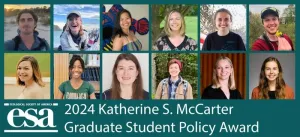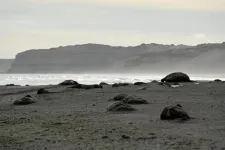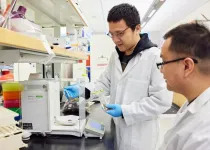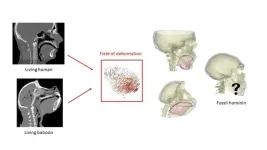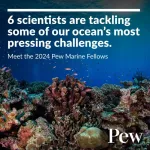“I am thrilled to welcome this latest cohort of Graduate Student Policy Awardees,” said ESA President Shahid Naeem. “The caliber of this year's awardees, as has been true for awardees in our program since its inception, reflects a promising future for ecological research and policy advocacy. These exceptional students exemplify the Society's commitment to nurturing innovative minds dedicated to addressing our most pressing scientific and environmental challenges."
This year 12 students received the 2024 GSPA award: Jem Baldisimo (Old Dominion University), Emerson Conrad-Rooney (Boston University), Jeannette E. Cullum (University of Illinois Urbana-Champaign), Megan M. Davis (Oregon State University), Laurel C. Field (Florida State University), Hannah A. Henry (Auburn University), Garrett J. Knowlton (University of Wisconsin-Madison), Helena McMonagle (University of Washington), Kaitlyn E. Meadows (Clemson University), Sophia C. Roberts (Yale University), Isaac J. VanDiest (Virginia Tech) and Kandake May Wallace (Florida A&M University).
Click here to see a Flickr album with photos of this year’s award winners
Jem Baldisimo is a Ph.D. candidate in the Ecological Sciences Program of Old Dominion University (ODU). She is a Fulbright Scholar from the Philippines and a Virginia Sea Grant Graduate Student Research Fellow. For over a decade, she has conducted research in different sectors, including private consulting, environmental nonprofits and academia. Her research focus is on the extinction risk of fishes in the marine aquarium trade. Additionally, she is heavily involved in advocating for the success and quality of life of international students, promoting women in STEM and improving diversity, equity and inclusion. Baldisimo received the 2020 Monarch Citizen of the Year award and was named the 2022 Ellen Neufeldt Graduate Student Leader of the Year at the Student Engagement and Enrollment Services Leadership Awards at ODU. She holds a B.S. in Environmental Science from the Ateneo de Manila University and a Master of Environment degree from the University of Melbourne.
Emerson Conrad-Rooney is a Ph.D. candidate in the Boston University Biology Department and a National Science Foundation (NSF) Graduate Research Fellow. Their combined interests in forest ecology and science policy led them to Boston University after conducting forest ecology research at the Hubbard Brook Experimental Forest, the Harvard Forest and the Marine Biological Laboratory Ecosystem Center while they were an undergraduate student. Conrad-Rooney’s dissertation research focuses on how climate change—both warmer summers and less snowpack in winter—impacts the ability of Northeastern forests to be carbon sinks. They are also a trainee in the Boston University Urban Biogeoscience and Environmental Health Program which is an NSF Research Traineeship program that trains students in science policy, science communication, urban ecology and public health. Through this program, they conducted an internship with the U.S. Global Change Research Program in 2022–2023, during which they analyzed nature-related content in the Fifth National Climate Assessment. Their long-term goal is to become a professor of forest ecology and bring experience in both ecology and science policy to their teaching and research. Conrad-Rooney received their B.A. in Biology from Wellesley College.
Jeannette E. Cullum is a Ph.D. candidate and NSF Graduate Research Fellow in the Program in Ecology, Evolution and Conservation Biology at the University of Illinois Urbana-Champaign (UIUC). She studies the impact of anthropogenic stressors on disease dynamics in freshwater ecosystems. Her research seeks to integrate experimental, field and theoretical ecology to elucidate complex interactions in these systems. Cullum is also interested in how research can be made accessible to broader audiences, such as policymakers and K–12 educators, and how it can be used to implement changes to federal law like the Clean Water Act. Currently, she is creating a K–12 curriculum unit related to her research where students investigate how pollution affects lake ecosystem health. She is involved with outreach in the community as well, participating in summer camps and after-school programs. Cullum received a B.S. in molecular and cellular biology with a minor in chemistry from UIUC, during which she participated in research with honey bees investigating the link between genes and behavior.
Megan M. Davis is a Ph.D. student in the Department of Integrative Biology at Oregon State University. Her research spans the fields of policy, social science and ecology and focuses on the reproductive capacity of intertidal kelps, which is part of a state-funded effort to gain a broad understanding of intertidal kelp dynamics along the Oregon coast. She is particularly interested in the ways in which foundational ecological research informs and is informed by people and policy. Davis has long been interested in the science-policy connection, holding related positions at Oceana, Urban Ocean Lab, Ocean Collective and The All We Can Save Project. Currently, she is an Oregon Sea Grant Legislative Fellow providing scientific counsel and support to the Oregon Legislative Coastal Caucus, which is a group of bipartisan, bicameral legislators that represent the entirety of the Oregon coast. Davis holds a B.F.A. in Environmental Studies and Studio Art from New York University.
Laurel C. Field is a Ph.D. student in the Department of Biological Science at Florida State University. Her research interests include marine protected area effectiveness, climate adaptation and resilience of socio-ecological systems and sustainable marine food systems. With funding from the Lenfest Ocean Program, her current research addresses climate change impacts to nearshore marine ecosystems in the Caribbean with a particular focus on marine conservation areas. She is working closely with local project partners to increase their long-term capacity to manage for climate change and is developing outreach programs to inform and engage communities. Previously, Field worked as a research assistant at Oregon State University (OSU), studying the impacts of marine disease on rocky intertidal communities along the U.S. West Coast. She then earned her M.S. in Marine Resource Management from OSU where she studied the effectiveness of marine protected areas overseas. Her career goals are to be a conservation science professional or natural resource manager involved with community-led and interdisciplinary research to address pressing socio-ecological questions. Field received her B.A. in Biology from Whitman College.
Hannah A. Henry is an M.S. student in Natural Resources at Auburn University, where her research focuses on the human dimensions of marine wildlife along the Alabama coast, particularly dolphin and sea turtle conservation. Her work lies at the intersection of conservation policy, stakeholder engagement and natural resource management. As the 2024 Joe Burns Memorial Wildlife Policy Intern and recipient of The Wildlife Society's Ronald F. Labisky Graduate Fellowship in Wildlife Policy, Henry conducts research, crafts policy materials, attends coalition meetings and supports legislative hearings and agency briefings. Additionally, she serves as a research affiliate at the Texas A&M Harte Research Institute for Gulf of Mexico Studies, leading a tri-national fisheries management survey. Henry contributes to initiatives aimed at increasing diversity and inclusion in the scientific community and was a 2023 Coastal and Estuarine Research Federation Rising TIDES Scholar. Before starting graduate school, she worked for the Florida Fish and Wildlife Conservation Commission and conducted research with the Florida International University Tropical Conservation Institute. Henry graduated from the University of Florida with a B.S. in Wildlife Ecology and Conservation.
Garrett J. Knowlton is an M.S. student at the University of Wisconsin-Madison in the Department of Integrative Biology. His current research is focused on using ecosystem and disturbance models to understand forest responses to fire in the northern Rocky Mountains under future climate scenarios. His broader interests include climate change adaptation, conservation planning and working at the intersection of research, science policy and management. Knowlton’s research is supported by an NSF Graduate Research Fellowship. Prior to graduate school, he worked with the NASA DEVELOP program and the National Park Service's Climate Change Response Program. He received a B.S. in Fisheries and Wildlife from Michigan State University.
Helena McMonagle is a Ph.D. candidate and NSF Graduate Research Fellow in the School of Aquatic and Fishery Sciences at the University of Washington. She is broadly interested in interactions between humans and the marine environment, particularly in the contexts of climate change and fishing. Her current research involves describing and quantifying the ecosystem services associated with small but abundant fish that live in the ocean’s twilight zone, using a combination of ecological modeling and data collection at sea and in the lab. Her professional interests lie in doing science and communication that inform conservation, sustainable use and stewardship of marine resources. McMonagle previously worked as a teaching assistant and research assistant at the Marine Biological Laboratory and the Woods Hole Oceanographic Institution in Woods Hole, Massachusetts. McMonagle graduated from Wellesley College with a B.A. in Biological Sciences.
Kaitlyn E. Meadows is an M.S. student in Biological Sciences at Clemson University. Her research is focused on wildlife conservation and global change ecology, particularly regarding Appalachian salamanders. A 2021 World Wildlife Fund Panda Ambassador and former Zoo Knoxville assistant keeper tasked with caring for eastern box turtles confiscated from the illegal wildlife trade, Meadows advocated with state lawmakers for stronger policies that fight wildlife trafficking in her home state of Tennessee. She previously held a research position funded by NSF’s Research Experiences for Undergraduates program, an opportunity that was formative and sparked her interest in pursuing her own independent research. Meadows graduated from the University of Tennessee, Knoxville with a B.S. in Ecology and Evolutionary Biology and a minor in Wildlife and Fisheries Science.
Sophia C. Roberts is a Master of Forest Science student at Yale's School of the Environment. Her research is dedicated to sustainable land management and forest restoration with a focus on tree diversity in tropical agroforestry systems. Leveraging remote sensing and machine learning methods, along with socio-geographic information, she aims to enhance the monitoring of biodiversity and promote sustainable practices in agroforestry. Prior to starting her graduate program, Roberts was a remote sensing data analyst at the nonprofit CTrees where she helped to generate tree cover maps and develop a global forest carbon inventory. Her ultimate goal is to bridge the gap between grassroots environmental actions and policy, emphasizing the essential alignment of sustainable development and ecosystem conservation. Roberts earned her B.S. in Environmental Science from the University of California, Los Angeles, with a minor in geography.
Isaac J. VanDiest is a Ph.D. candidate in the Department of Biological Sciences at Virginia Tech. His research seeks to understand how urbanization alters food availability, diet and nutrition of a local bird species. VanDiest volunteers with Virginia Scientist-Community Interface, a graduate student science policy group that works with community advocates to provide scientific knowledge that addresses their needs. Before graduate school, he worked in both private and federal conservation jobs monitoring habitat use by a “species of concern” woodpecker, and studying how it is impacted by resource extraction. After defending his dissertation, VanDiest hopes to work for a federal land management agency where he will promote the treatment of community members as serious stakeholders. He completed his B.S. in Wildlife Biology at the University of Montana.
Kandake May Wallace is a Ph.D. candidate at Florida A&M University’s School of the Environment. Wallace’s research is focused on environmental justice and political participation. Specifically, she is investigating the relationship between air pollution exposure and voter turnout in Florida, with an aim to inform policy and funding decisions surrounding environmental justice efforts. A first-generation doctoral student with a lineage from the Global South, Wallace comes from a working-class blended family that taught her the values of hard work, compassion and resiliency, which have shaped her identity as an academic and activist. A two-time HBCU scholar, she graduated from Howard University with a B.S. in Chemistry.
###
The Ecological Society of America, founded in 1915, is the world’s largest community of professional ecologists and a trusted source of ecological knowledge, committed to advancing the understanding of life on Earth. The 8,000 member Society publishes six journals and a membership bulletin and broadly shares ecological information through policy, media outreach, and education initiatives. The Society’s Annual Meeting attracts 4,000 attendees and features the most recent advances in ecological science. Visit the ESA website at https://www.esa.org.
Follow ESA on social media:
Twitter/X – @esa_org
Instagram – @ecologicalsociety
Facebook – @esa.org
END
